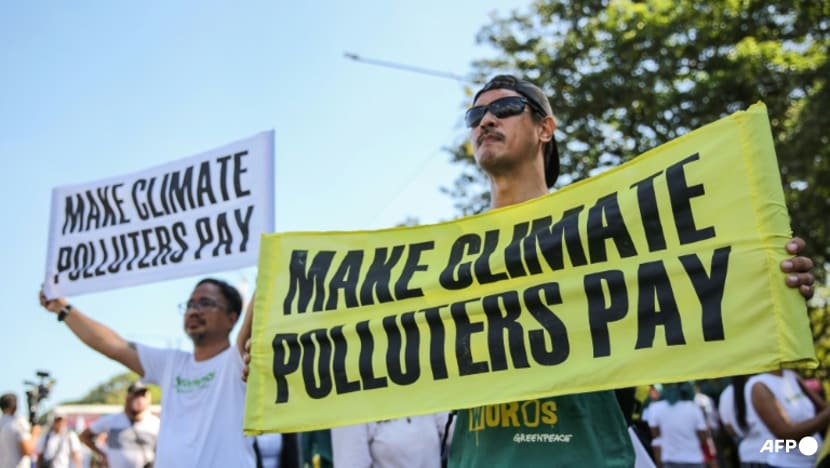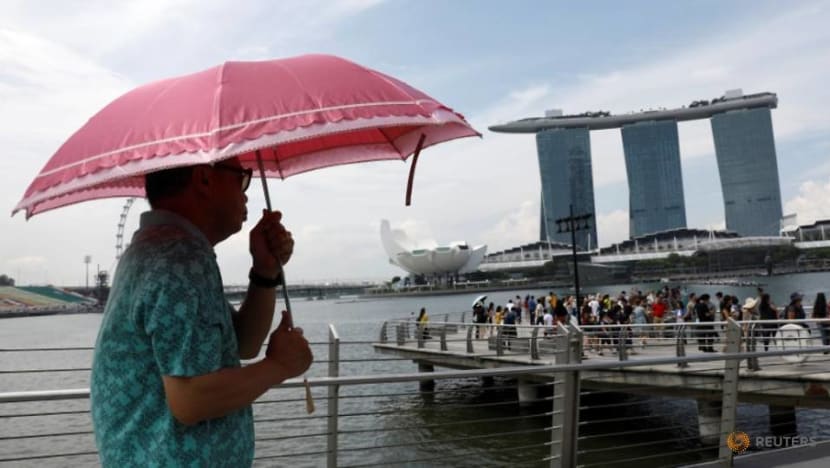CNA Explains: What does the historic COP28 deal to move away from fossil fuels mean for the world?
Experts tell CNA why time is still running out - and how question marks remain over holding countries to account - when it comes to fixing the climate crisis.

Dramatically scaling up renewable energy while winding down fossil fuels use is crucial to limiting global warming. (Photo: AFP/Earvin Perias)

This audio is generated by an AI tool.
The number one culprit behind climate change is fossil fuels. And this week, nearly 200 countries made a first-ever deal to start cutting down on them, in what could be a gamechanger for the planet’s health.
The agreement, struck at the COP28 climate talks in Dubai after a fortnight of fierce negotiations, “basically signals the end of the fossil fuel era”, said chief climate risk strategist Soenke Kreft of the United Nations University - Institute for Environmental and Human Security.
Why is the deal so important?
Fossil fuels – coal, oil and gas – account for more than 75 per cent of global greenhouse gas emissions, and nearly 90 per cent of all carbon dioxide emissions.
With emissions continuing to rise, scientists believe the world may cross the crucial 1.5 degrees Celsius global warming limit – as called for in the Paris Agreement – in seven years.
Breaching that threshold could lead to extreme weather patterns such as longer heatwaves and more intense storms.
Already, 2023 has been confirmed as the hottest year on record, due to a combination of global warming and the El Nino effect.
Thousands have died this year due to extreme heat, wildfires, storms and floods linked to climate change.
Emissions need to be reduced by 45 per cent by 2030, observers stress, if we want to avert the worst consequences of the climate crisis.
“As things currently stand, we're going to increase them by almost 10 per cent. So we're not on course,” said Mr Tom Burke, co-founder and chairman of climate change think-tank E3G. “We really do have to do a lot more if we're going to stay below 1.5 (degrees Celsius).”
And that means taking “giant leaps” instead of baby steps to accelerate the transition towards clean energy, he added.
What are some issues with the agreement?
While hailed by many global leaders as a step forward, the deal lacks fixed timelines and allows for plenty of interpretive wiggle room, experts said.
“A transition away from fossil fuels in the energy system, which is the precise wording there, differs a lot from the maximum claim of a fossil fuel phase out,” said Professor Frank Jotzo, head of energy at the Australian National University's Institute for Climate, Energy and Disaster Solutions.
“The emphasis on national circumstances and on equity leaves it up to each individual nation, to each individual government, to determine to what extent they will keep relying on fossil fuels in that transition.”
There was a clear hesitancy to mention a “phase down” or “phase out” of fossil fuels, said Ms Nneka Chike-Obi, head of Asia-Pacific ESG research and ratings at Sustainable Fitch.
“There are still a number of emerging economies, mainly in Sub-Saharan Africa, that are very concerned that a rapid transition away from fossil fuels would harm their economic development,” she said.
“I think it was worded in a way that both sides can feel that they've come away with a bit of a victory.”
The text also talks about accelerating zero- and low-emission technologies, including the likes of carbon capture and utilisation and storage - the process of capturing and storing carbon dioxide before it can be released into the atmosphere.
“We know that these are unproven technologies and if we continue to bank on these, then we are actually providing a free pass to the fossil fuel industry that wants to portray as if carbon capture and utilisation and storage technologies are going to solve the problem,” said Mr Harjeet Singh, head of global political strategy at Climate Action Network International.
“These technologies may allow the fossil fuel industry to prolong the use of fossil fuels and continue with business as usual.”
What else must be done to fix the climate crisis?
While the deal recognises that support is needed by developing countries - which are most vulnerable to the impacts of rapid climate change - it stops short of pointing out that rich countries have a responsibility to provide, said Mr Singh.
“The needs are now running into trillions (of dollars) if you really want the transition to happen, and also (for) supporting countries in the Global South who are facing climate emergencies.”
At the climate meeting in the United Arab Emirates, an ambitious new “loss and damage” fund was also formalised, to compensate vulnerable countries suffering the irreversible impacts of climate change.
Related:
To date, more than US$700 million has been pledged by wealthier nations.
Experts said the overall move represented progress, despite the amount of money being too small compared to the needs and the working mechanisms of the fund remaining unclear.
“We have essentially a resolution on an issue which looked almost impossible to resolve just a few years ago,” said Prof Jotzo. “The next station really is for much more money to be inserted into the loss and damage fund, and then to come to stronger settings on supporting global adaptation.”
What’s Southeast Asia’s role here?
Analysts pointed out that Southeast Asia, one of the world’s fastest-growing energy markets, is critical in the energy transition.
The region’s energy mix is still skewed towards fossil fuels, which made up about 83 per cent in 2020 compared to renewables’ share of 14 per cent, according to a report by the ASEAN Centre for Energy last year.
This heavy dependence on coal, gas and oil is hurting national commitments to curb emissions and adopt cleaner energy sources.

Speaking to reporters at the COP28 summit, Singapore’s Minister for Sustainability and the Environment Grace Fu acknowledged that every country has its own limitations, including the need to balance economic development with environmental protection and climate action.
She also said the deal could have been more ambitious, with greater clarification on coal-fired plants; but that it was ultimately “a significant stride towards global collective action”.
Who will hold the countries to account?
It remains unclear whether the new COP28 deal will spur countries to take stronger climate action.
Prof Jotzo described it as a “soft compliance framework” asking countries to adhere to the “spirit” of decisions made.
Countries have to report their emissions to the United Nations, and this forms a part of the accountability process, said Mr Burke.
“But at the end of the day, there's no global government … We've got no mechanism other than peer pressure to enforce what's happening.”
At the summit, the United States and China, the world’s biggest polluters, signalled their intent to continue working together to lead the global community in the right direction.
“We need to take what wins we can here,” said Ms Chike-Obi, who expects future COPs to focus more on how economies and lifestyles will be adapted for a warmer environment.
Azerbaijan, another fossil fuel-reliant country, is set to host next year's COP29 summit.
That major oil-producing nations wish to host climate talks can be seen as an acceptance that the role of fossil fuels is going to change in the medium term, said Ms Chike-Obi.
Being part of the climate summit will allow them to better understand and position themselves for the future net zero economy, she added. “I think that will be a generous way of viewing it.”

















